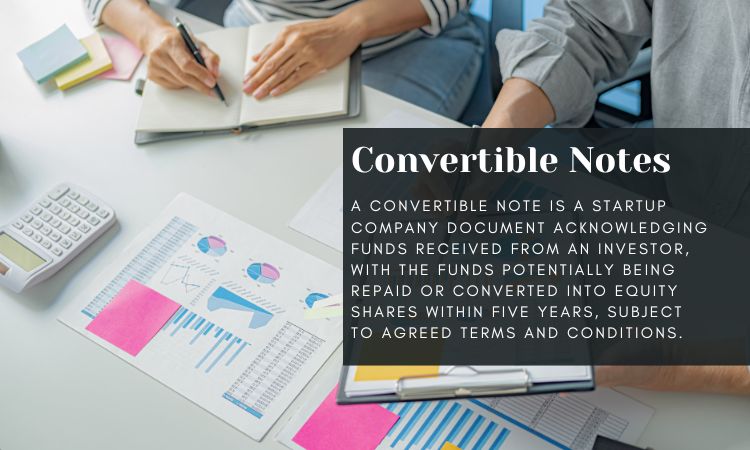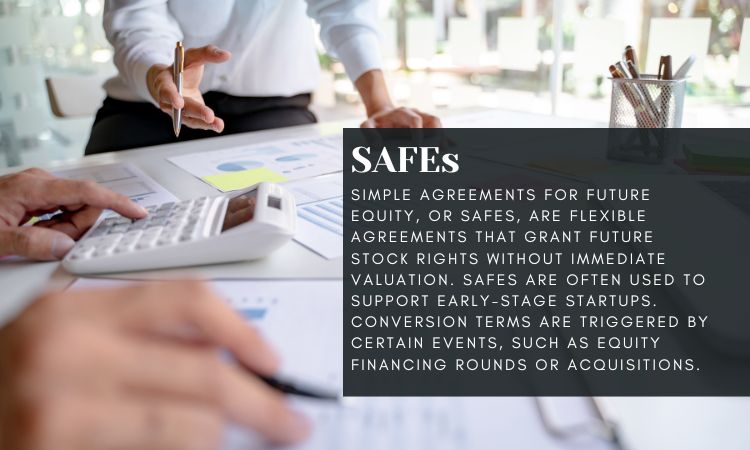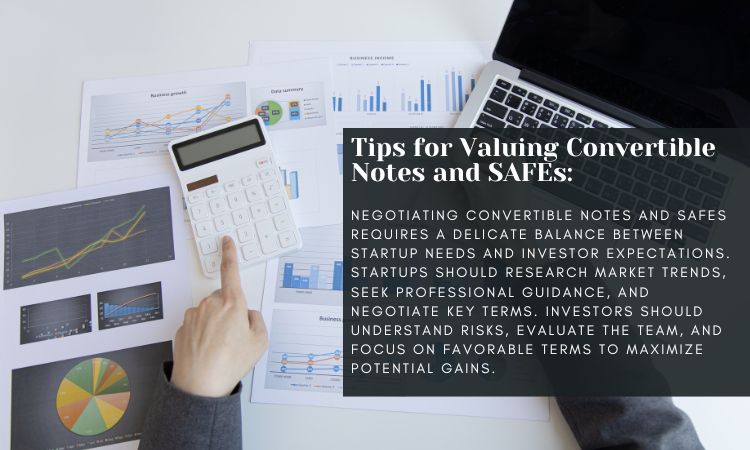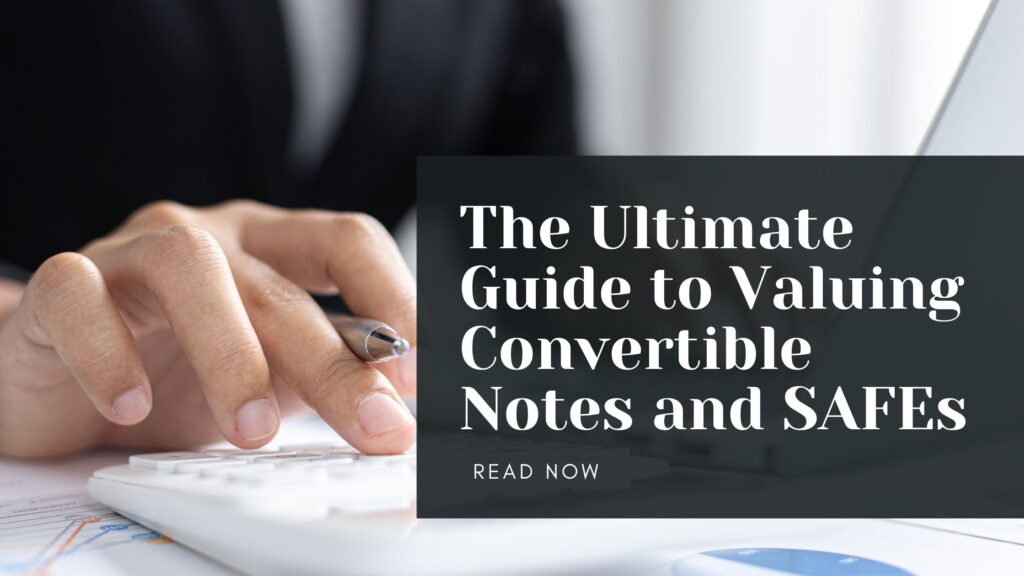Convertible notes and SAFEs are funding tools that bridge the gap between early-stage startups and traditional equity financing. They offer flexibility for startups while valuation determines the conversion price and investor ownership.
Investors, on the other hand, benefit from the potential for high returns if the startup flourishes, while also having protections in place to mitigate risk. However, to leverage these financing tools effectively, both startups and investors need a firm grasp on valuation. This comprehensive guide dives deep into the world of convertible note and SAFE valuation, equipping you with the knowledge to navigate this critical aspect and make informed decisions that maximize value in your startup’s funding journey.
Table of Contents
ToggleUnderstanding Convertible Notes
Convertible notes are short-term loans that convert to equity in a startup’s future financing round. They offer flexibility for startups in early funding stages while providing investors with the potential for higher returns. However, investors face some risk if the valuation doesn’t grow as expected, and the loan has a maturity date for repayment or conversion.
Let’s break down the key terms that define how this conversion works:
- Conversion Price: This is the price per share at which the note converts into equity, typically set by a fixed price or a discount on a future round’s price. A lower conversion price equals more shares for the investor.
- Valuation Cap: A valuation cap protects investors by limiting the conversion price if the company’s valuation surges beyond the cap during conversion, ensuring they get ownership at a more favorable valuation.

- Discount Rate: The discount rate rewards investors for the early-stage risk of financing a startup with uncertain valuation. It’s a lower price per share for taking a chance on a young company.
- Maturity Date: The maturity date sets a deadline for conversion or repayment, ensuring a clear timeline for both the company and the investor. If not converted by the maturity date, the company must either repay the note with interest or negotiate an extension with the investor.
Understanding SAFEs (Simple Agreements for Future Equity)
SAFEs (Simple Agreements for Future Equity) are another financing tool for startups, similar to convertible notes. However, SAFEs aren’t technically debt and lack a maturity date or interest accrual.
The conversion mechanism also differs. SAFEs typically convert automatically upon the closing of the next qualified financing round, offering more flexibility for startups with smaller funding goals.
Key terms associated with SAFEs include:
- Valuation Cap: Protects investors by limiting the price per share at which their SAFE converts into equity, even if the company’s valuation skyrockets during a future financing round. This ensures investors receive a favorable ownership stake despite the early-stage uncertainty about the company’s true value.
- Discount for Subsequent Financing: Rewards early investors with a lower share price compared to the next financing round, incentivizing them for taking on early-stage risk and providing valuable capital to get the startup off the ground.
- Most-Favored Nation Clause: The MFN clause ensures SAFE investors receive the most favorable conversion terms available to any other investors in a subsequent financing round.
Comparing Convertible Notes and SAFEs: Choosing the Right Tool
Convertible notes and SAFEs are both valuable tools for startup funding, but they have distinct features. Here’s a table that summarizes the significant differences:
Feature | Convertible Note | SAFEs |
Debt Instrument | Yes | No |
Maturity Date | Yes | No |
Interest Rate | Possible | No |
Conversion Trigger | Qualified financing round or maturity date | Next qualified financing round |
Conversion Mechanism | Discount rate or conversion price | Valuation cap and discount for subsequent financing |
Valuation Cap | Yes | Yes |
Most-Favored Nation Clause | Not typical | Possible |
The Valuation Process: How Much is My Company Worth?
Valuation might sound complex, but for convertible notes and SAFEs, it simply boils down to determining a fair price per share at which the note or SAFE converts into actual company ownership. This price is critical because it directly affects how much of the company the investor receives.
Why Valuation Matters:
- Startups: Giving away too much ownership too early can be detrimental. A well-established valuation ensures you receive a fair price for your company, preventing dilution – the decrease in ownership percentage for existing shareholders when new shares are issued.
- Investors: Their goal is to secure a significant stake in the company for their investment, but not so much that it limits their potential returns. A sound valuation protects them from overpaying for the company’s shares, especially in the early stages when the true value might be uncertain.

Common Valuation Methods for Startups:
- Pre-money Valuation: This method estimates the company’s total value before the convertible note or SAFE investment is factored in. Imagine it as the company’s baseline value before the new funding is received. There are several ways to calculate pre-money valuation, often involving factors like market size, product potential, and the team’s experience.
- Discounted Cash Flow (DCF) Method: This method forecasts the company’s future cash flows and then discounts them back to their present value. It’s a more complex approach but can be valuable for startups with a clear path to profitability. Financial projections play a crucial role here, as the accuracy of the DCF method hinges on the reliability of the company’s future cash flow estimates.
- Market Multiples: Sometimes, simpler methods are used for startups. Market multiples involve comparing your company to similar companies in your industry that have recently been valued or acquired. By analyzing their valuation metrics like price-to-earnings ratio or revenue multiples, you can derive a ballpark valuation for your own company.
The Role of Financial Projections:
Financial projections are essentially educated guesses about your company’s future financial performance. They typically include forecasts for revenue, expenses, and cash flow over a specific period. For valuation purposes, these projections are crucial for supporting any valuation method chosen. Whether using pre-money valuation, DCF, or market multiples, having a solid understanding of your company’s potential future earnings strengthens your negotiation position and helps ensure both you and the investor agree on a fair conversion price for your convertible note or SAFE.
Tips for Valuing Convertible Notes and SAFEs: Negotiating for Success
Negotiating convertible notes and SAFEs involves a delicate balance between startup needs and investor expectations. Here are some actionable tips to ensure a win-win situation:
For Startups:
- Do your research: Understand market trends for similar startups and recent funding rounds in your industry. This knowledge provides a baseline for negotiating the valuation cap and discount rate.
- Seek professional guidance: Consider consulting a valuation expert to get an independent assessment of your company’s value. This strengthens your position and ensures you’re not undervaluing your startup.
- Negotiate key terms: Don’t be afraid to negotiate the valuation cap, discount rate, and maturity date (for convertible notes) to secure fair terms for your company.
For Investors:
- Understand the risks: Early-stage investments are inherently risky. While convertible notes and SAFEs offer potential for high returns, be prepared for the possibility of the startup failing.
- Evaluate the team and market: Invest in a team with a strong track record and a clear understanding of the market they’re operating in. This increases the chances of a successful exit and ensures your investment yields positive returns.
- Negotiate investor protections: Focus on negotiating favorable terms like the valuation cap and the Most-Favored Nation clause (for SAFEs) to mitigate your risk and maximize potential gains.
- Seek professional guidance: Consider consulting with valuation experts like Marcken Consulting who can provide valuable insights and analysis to strengthen your negotiation position and ensure a fair valuation for your investment.

Conclusion
Convertible notes and SAFEs are powerful tools for fueling your startup’s growth. By understanding valuation and its impact on these instruments, you can confidently navigate funding conversations and secure the resources needed to bring your vision to life. Remember, Marcken Consulting is here to guide you through the valuation process. Contact us today to explore how our expertise can empower your startup journey.
Frequently Asked Questions
Q1. Can I negotiate the discount rate on a convertible note?
Yes, the discount rate is negotiable. Startups can argue for a lower rate based on their merits, such as a strong team, a proven product-market fit, or traction in the market, while investors may seek a higher rate for the early-stage risk and the potential for a higher return on their investment.
Q2. Can I convert a convertible note into a SAFE, or vice versa?
Technically, no. Convertible notes and SAFEs are distinct instruments. However, it’s possible to negotiate with the investor to amend the original agreement and convert it to the other instrument, considering factors like market conditions and the company’s current stage. Legal counsel is recommended for such a change.
Q3. What are some common mistakes to avoid when using convertible notes and SAFEs?
Common mistakes include setting an overly low valuation cap, not understanding the conversion mechanism, or neglecting to seek legal advice. Thorough research, clear communication, and professional guidance can help avoid these pitfalls.


